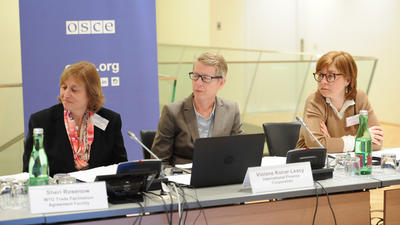-
Our work
-
Fields of work
- Arms control
- Border management
- Combating trafficking in human beings
- Conflict prevention and resolution
- Countering terrorism
- Cyber/ICT Security
- Democratization
- Economic activities
- Education
- Elections
- Environmental activities
- Gender equality
- Good governance
- Human rights
- Media freedom and development
- Migration
- National minority issues
- Policing
- Reform and co-operation in the security sector
- Roma and Sinti
- Rule of law
- Tolerance and non-discrimination
- Youth
- Field operations
- Projects
-
Meetings and conferences
- Summit meetings
- Review Conferences
- Ministerial Council meetings
- Plenary meetings of the Permanent Council
- Plenary Meetings of the Forum for Security Co-operation
- Security Review Conferences
- Annual Implementation Assessment Meetings
- Economic and Environmental Forum
- Economic and Environmental Dimension Implementation Meetings
- Human rights meetings
- Media conferences
- Cyber/ICT security conferences
- Conference of the Alliance against Trafficking in Persons
- Gender equality conferences
- Annual OSCE Mediterranean conferences
- Annual OSCE Asian conferences
- Partnerships
-
Fields of work
-
Countries
- All
-
Participating States
- Albania
- Andorra
- Armenia
- Austria
- Azerbaijan
- Belgium
- Belarus
- Bosnia and Herzegovina
- Bulgaria
- Canada
- Croatia
- Cyprus
- Czechia
- Denmark
- Estonia
- Finland
- France
- Georgia
- Germany
- Greece
- Holy See
- Hungary
- Iceland
- Ireland
- Italy
- Kazakhstan
- Kyrgyzstan
- Latvia
- Liechtenstein
- Lithuania
- Luxembourg
- Malta
- Moldova
- Monaco
- Mongolia
- Montenegro
- The Netherlands
- North Macedonia
- Norway
- Poland
- Portugal
- Romania
- Russian Federation
- San Marino
- Serbia
- Slovakia
- Slovenia
- Spain
- Sweden
- Switzerland – OSCE Chairpersonship 2026
- Tajikistan
- Türkiye
- Turkmenistan
- Ukraine
- United Kingdom
- United States of America
- Uzbekistan
- Asian Partners for Co-operation
- Mediterranean Partners for Co-operation
-
Structures and institutions
- Chairpersonship
-
Secretariat
- Secretary General
- Office of the Secretary General
- Conflict Prevention Centre
- Transnational Threats Department
- Office of the Special Representative and Co-ordinator for Combating Trafficking in Human Beings
- Office of the Co-ordinator of OSCE Economic and Environmental Activities
- Gender Issues Programme
- Opportunities for Youth
- Department of Human Resources
- Department of Management and Finance
- Office of Internal Oversight
- Documentation Centre in Prague
- Institutions
-
Field operations
- Presence in Albania
- Centre in Ashgabat
- Programme Office in Astana
- Programme Office in Bishkek
- Mission to Bosnia and Herzegovina
- Programme Office in Dushanbe
- Mission in Kosovo
- Mission to Moldova
- Mission to Montenegro
- Mission to Serbia
- Mission to Skopje
- Project Co-ordinator in Uzbekistan
- Closed field activities
- Parliamentary Assembly
- Court of Conciliation and Arbitration
- Organizational structure
- About us
Press release
Reducing costs and burdens on trade transactions, improving co-ordination and increasing trust within OSCE region discussed at workshop in Vienna

- Date:
- Place:
- VIENNA
- Source:
- OSCE Secretariat
- Fields of work:
- Economic activities
VIENNA, 26 March 2019 – Economic connectivity in the OSCE region, trade facilitation, co-operation between state bodies and the private sector were the focus of a workshop hosted by the Office of the Co‑ordinator of OSCE Economic and Environmental Activities (OCEEA) today in Vienna.
“The objective of today’s discussion is to find ways to reduce costs and burdens on trade transactions, improve and harmonize information flows within and between countries, and to enhance alignment with international standards, in order to increase good-neighborly relations and trust,” said Lorenzo Rilasciati, Acting Deputy Co-ordinator/Head of Economic Activities at OCEEA.
More than 50 participants from Central Asia, Moldova, and Belarus, as well as from OSCE participating States, exchanged best practices in co-ordinating trade facilitation policies. A concluding document reflecting outcomes of the discussions was agreed upon by the participants.
“We will focus on generating new ideas and suggestions for the improvement of domestic co-ordination of trade facilitation and cross-border co-operation by exchanging best practices and experiences from Central Asia and Eastern Europe,” said Rilasciati. “Engaging relevant government authorities and the private sector – strengthening dialogue – is the path to take.”
“The OSCE, its field operations and other partners will continue to use this platform to strengthen regional co-operation in the area of trade facilitation,” he added.
Violane Konar-Leacy, International Finance Corporation (IFC) Manager for the European and Central Asia Trade Facilitation Support Program, highlighted the importance of high-level focus and structured co-ordination by all stakeholders in moving the trade facilitation agenda forward in order to reap the benefits from its implementation.
Gordana Tosheva from the USAID Regional Growth Project explained some of the common challenges and solutions to effective national trade facilitation committee operations.
The OSCE Ministerial Council Decision 4/16 on "Strengthening Good Governance and Promoting Connectivity” encourages participating States that are members of the World Trade Organization (WTO) to support full implementation of its Trade Facilitation Agreement. “WTO members must provide a series of notifications that reflect the needs and implementation time frames of all the relevant agencies,” said Sheri Rosenow, from the WTO. “National committees of the countries must co-ordinate with all relevant agencies and the private sector to prepare these notifications, as well as to implement them and monitor progress.”
Today’s event was supported by the OSCE Programme Offices in Bishkek and Dushanbe, the OSCE Centre in Ashgabat and the OSCE Project Co-ordinator in Uzbekistan. It was part of the project on Promoting Economic Connectivity in the OSCE, funded by the governments of Germany, Switzerland and Austria.